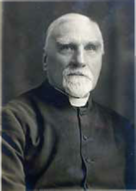

Web design © Graeme de Lande Long. Terms & Conditions.



Community Website
Scaynes Hill Village



Obituary for Rev. Frederic Willett (1838-1939)
07 Sep Posted by Graeme de Lande Long
Death of England's Oldest Clergyman at Haywards Heath
The oldest clergyman in England, the Rev. Frederic Willett, of Fir Tree End, Church Road, Haywards Heath, died on Monday afternoon, aged 100 years. He had been ill for about a month. Mr. Willett would have celebrated his 101st birthday on June 16th. At his bedside were his son, Lieut.-Colonel F.W.B. Willett, DSO, and his daughters, Mrs. H. Dearden and Mrs. F. Wisden. He remained conscious to the end.
The following is reproduced from the Sussex Express & County Herald, Friday June 9th 1939
The oldest clergyman in England, the Rev. Frederic Willett, of Fir Tree End, Church Road, Haywards Heath, died on Monday afternoon, aged 100 years. He had been ill for about a month. Mr. Willett would have celebrated his 101st birthday on June 16th. At his bedside were his son, Lieut.-Colonel F.W.B. Willett, DSO, and his daughters, Mrs. H. Dearden and Mrs. F. Wisden. He remained conscious to the end.
Born on June 16th, 1838, at Brighton, Mr. Willett was the third son of the late Mr. William Willett, of Kemp Town, who married a Miss Verrall of Southover, Lewes. He first attended school at Lewes and later he went to Steyning Grammar School. In 1852 he moved to Westminster School, and soon made a name for himself in rowing, his favourite sport, being "Head of the River" in 1856. From Westminster he went up to Trinity, Cambridge, where he rowed in the third Trinity boat as "Head of the River". He took his degree in 1860, was ordained deacon the next year and priest in 1862.
REFUSED EASY LIVING
His first curacy was a St. Peter's Collegiate Church, Wolverhampton, and while there his father bought him the living at Slindon, near Arundel. However, he refused it because he said he wanted more arduous work than that which a small village could provide. That these were no idle words was soon seen, for in the next year he accepted the living of West Bromwich in the middle of the "Black Country". In 1868 he married Mary, eldest daughter of Lieut.-Colonel J.N. Bagnall.
The Rev. Frederic Willett returned to his native country on inheriting from his uncle Bedales, Lindfield, and for a quarter of a century he looked after St. Augustine's, Scaynes Hill, without stipend. He relinquished his care of the church in 1905 and went to reside at Seaford, moving to Haywards Heath in 1914.
©Johnston Press plc. Image created courtesy of the British Library Board

Rev. Frederick Willett
OLD SUSSEX FAMILY
Mr. Willett was a member of a well-known Sussex family, and his grandfather was Mr. William Catt, who was at one time owner of the Tidemills, Bishopstone. In 1865, by Royal licence, under the will of a relative, Mr. Willett's father and several of his brothers changed their name from Catt to Willett.
In mid Victorian days Mr. Willett was known as the "Publican Parson", and he was one of the few clergy who have ever managed a public house. It was the Anchor, at Scaynes Hill, which was included in the estate he inherited from his uncle. He held the conviction that by treating the frequenters of public houses not as "black sheep" but like other parishioners, he could not only gain their confidence and friendship but could do more in putting down mis-doing and drunkenness than by total abstinence methods. He put his theories into practice and frequently visited the public house.
PREACHED AT 95
Mr. Willett had the double distinction of being the oldest Old Westminster and the oldest living governor of St. Bartholomew's Hospital, London. In 1933, when he was 95 years of age, he preached his last sermon at the Armistice commemoration service at Lindfield Parish Church, where he worshipped as a boy. On that occasion ex-Service men were led by his son, Lieut.-Colonel F.W.B. Willett. Last year he attended the eight o'clock communion on Ascension Day at St. Wilfrid's Church, Haywards Heath. He had a remarkably fine memory and could recall events that happened 90 years ago. He kept in close contact with his old friends, and took a keen interest in everything to the end.
When he celebrated his centenary last year a telegram from the King and Queen was among the 200 messages of congratulation which were received from all parts of the world. Telegrams were also received from the Bishop of Chichester (Dr. G.K.A. Bell), the headmaster of Westminster School, and from Trinity College, Cambridge. Mr. Willett was particularly pleased when he was told that the headmaster of Westminster School had promised a day's holiday in honour of the occasion.
The funeral service will be held at St. Wilfrid's Church to-day (Friday) at 3 pm, and the internment will follow privately in the family grave at Wivelsfield. It was Mr. Willett's request that no flowers should be sent.